You know that feeling when you're drowning in data but can't quite make sense of it all? Well, machine learning is here to turn that ocean of numbers into a tidal wave of opportunity for your business.
Think about it - what if you could predict trends before they happen? Anticipate customer needs before they even realize they have them? Optimize processes and cut costs without hiring armies of analysts? That's the power of machine learning.
This isn't just tech babble either. Real companies across all industries are using machine learning to gain a competitive edge. From retail giants personalizsing recommendations to healthcare innovators detecting diseases earlier, it's revolutionizing how we do business.
And you don't need to be a data scientist to hop on board. This guide will walk you through machine learning - the different techniques, how to implement them step-by-step, and real-life examples to inspire you.
The future of your business could be just a few pages away. Ready to stop treading data and start riding the wave? Let's dive in!
Benefits of Machine Learning for Businesses
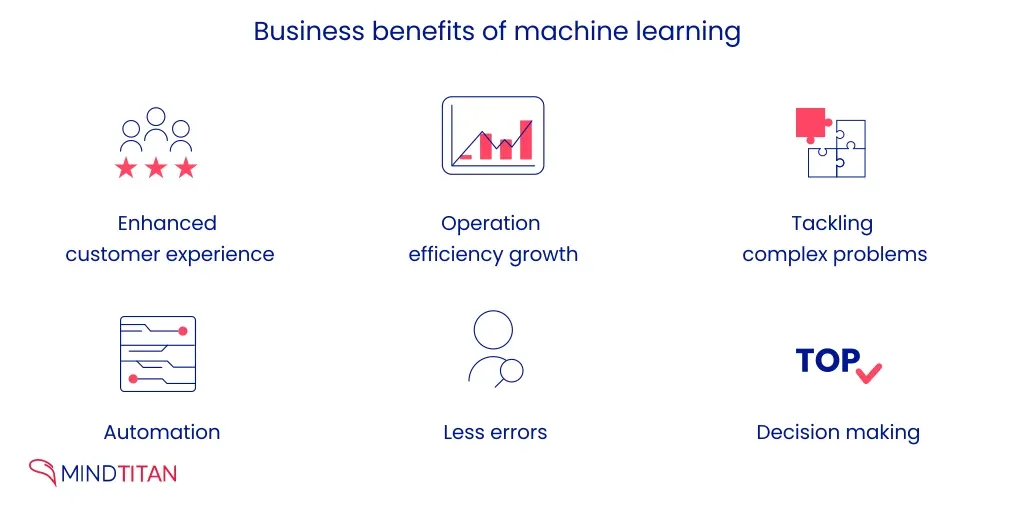
Machine learning development services benefit businesses, enabling them to thrive in today's data-driven world.
Let's explore some of the key advantages offered by this transformative technology.
Cost reduction and efficiency improvement
Implementing machine learning development service algorithms can significantly reduce costs and enhance operational efficiency.
By automating repetitive tasks and optimizing resource allocation, businesses can streamline processes and save valuable time.
Machine learning also enables predictive maintenance, reducing downtime and minimizing associated expenses.
Enhanced decision-making and insights
Machine learning empowers businesses with data-driven decision-making capabilities.
By analyzing vast amounts of data, algorithms can identify patterns and trends that human analysts may overlook.
This provides valuable insights to inform strategic decisions, market forecasting, and risk assessment.
Through accurate predictions and actionable recommendations, machine learning development service enables businesses to make informed choices.
Personalized customer experiences
Machine learning development service enables businesses to deliver personalized experiences, meeting the unique needs and preferences of individual customers.
By analyzing customer behavior and historical data, algorithms can provide personalized recommendations and targeted marketing campaigns.
This enhances customer satisfaction and loyalty, leading to increased sales and revenue.
Next, we will cover types of machine learning development service algorithms.
Types of Machine Learning Algorithms
Machine learning algorithms serve as the building blocks for developing intelligent systems.
Let's explore some of the fundamental types of machine learning:
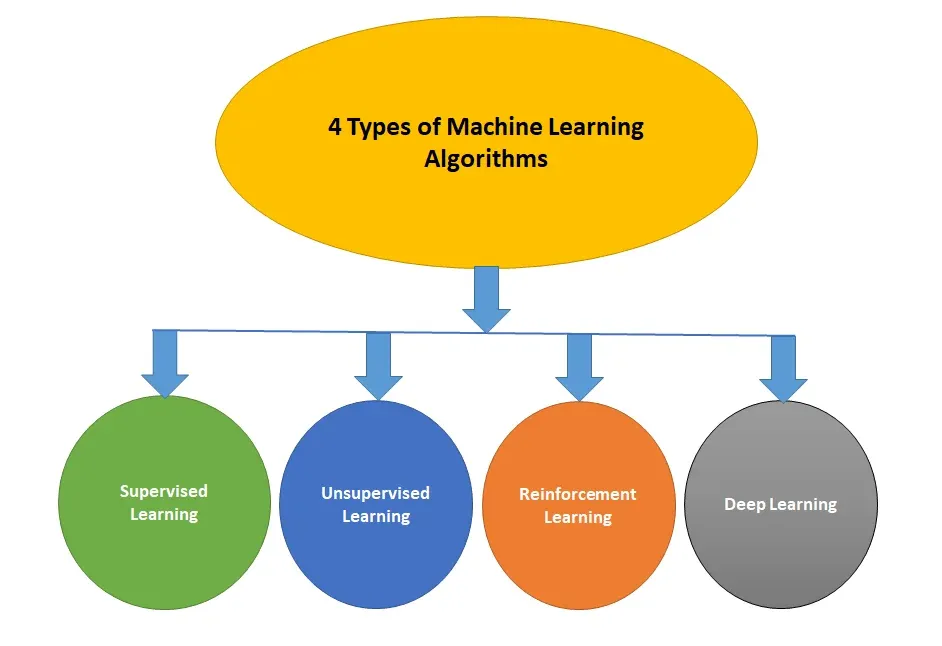
Supervised learning
Supervised learning involves training a model with labeled data, where the algorithm learns to predict the correct output based on input variables.
It finds applications in tasks such as classification and regression, making it useful for spam detection, sentiment analysis, and credit scoring.
Unsupervised learning
Unsupervised learning deals with unlabeled data, where the algorithm discovers hidden patterns and structures without prior knowledge.
This type of learning is useful in clustering, anomaly detection, and dimensionality reduction, enabling businesses to uncover insights from unstructured or unlabeled datasets.
Reinforcement learning
Reinforcement learning involves an agent learning from interactions with an environment to maximize rewards.
By taking action and receiving feedback, the algorithm learns optimal strategies to achieve predefined goals.
Reinforcement learning finds applications in robotics, game-playing, and autonomous systems.
Deep learning
Deep learning, a subset of machine learning, utilizes artificial neural networks to mimic the human brain's structure and function.
It excels in processing and analyzing large-scale, unstructured datasets, such as images, speech, and natural language.
Deep learning enables breakthroughs like computer vision, speech recognition, and natural language processing.
Incorporating these different machine learning algorithms empowers businesses to leverage data effectively and build intelligent systems that drive growth and innovation.
Next, we will see the steps in building a machine learning development service model.
Suggested Reading:
Why Machine Learning Development is Pivotal for your Business?
Steps in Building a Machine Learning Model
Building a machine learning development service model involves crucial steps that lay the foundation for accurate predictions and valuable insights.
Let's explore the key stages of this process:
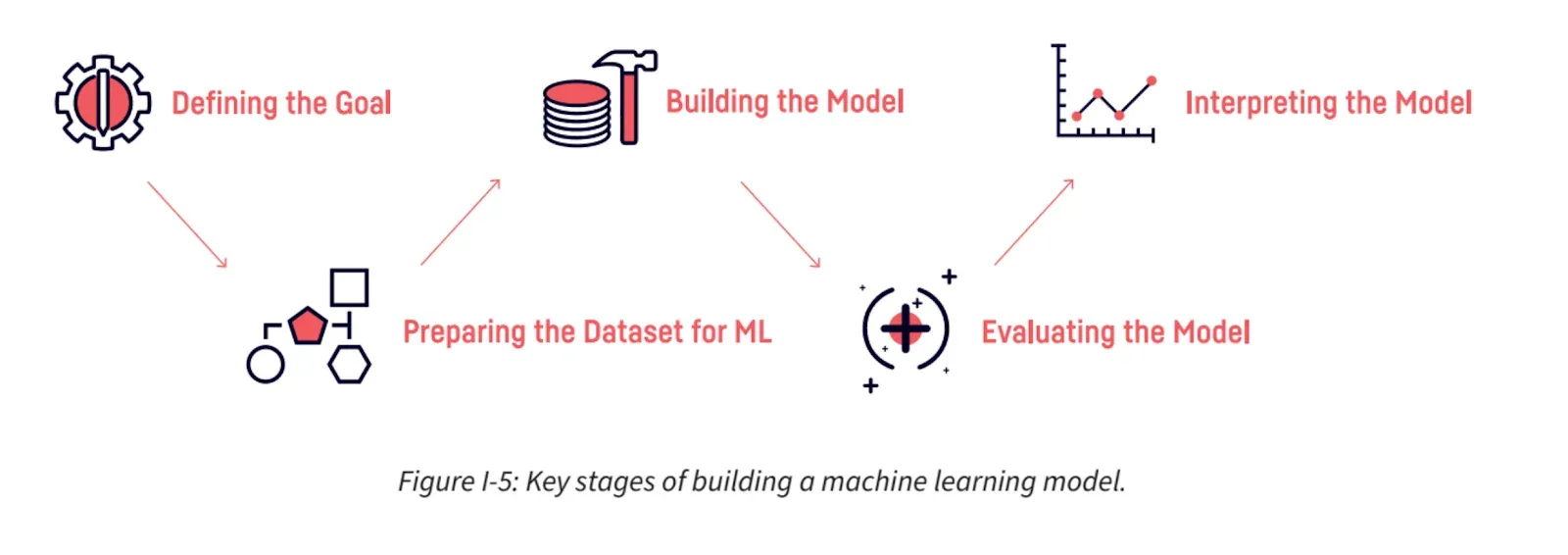
Data collection and preprocessing
The first step in building a machine learning development service model is gathering relevant data.
This may involve extracting data from various sources, such as databases, APIs, or data scraping. Once collected, the data needs to be cleaned and preprocessed.
This includes handling missing values, standardizing formats, and addressing outliers to ensure data quality and consistency.
Feature selection and engineering
In this step, relevant features are selected from the dataset to build the model.
Feature engineering involves transforming and creating new features from the existing data to enhance the model's performance.
Techniques such as scaling, encoding categorical variables, and creating interaction or polynomial features are applied to improve predictive accuracy.
Model training and evaluation
Once the data is prepared, it is split into training and testing sets.
The model is then trained on the training set, where it learns patterns and relationships in the data.
Various machine learning development service algorithms, such as decision trees, support vector machines, or neural networks, can be utilized depending on the problem at hand.
After training, the model is evaluated using the testing set, measuring its performance metrics like accuracy, precision, or recall.
Deployment and monitoring
Once a satisfactory model is obtained, it is deployed to make predictions on new, unseen data.
This could involve integrating the model into a production system or developing an application that utilizes the model's capabilities.
Monitoring the model's performance ensures its accuracy and reliability over time. Maintenance and updates may be necessary to adapt to changing data patterns and business requirements.
Next, we will cover some use cases of machine learning development service in different industries.
Use Cases of Machine Learning in Different Industries
Machine learning has found significant applications across various industries, revolutionizing processes and driving innovation.
Let's explore some prominent use cases of machine learning development service in different sectors:
Retail and e-commerce
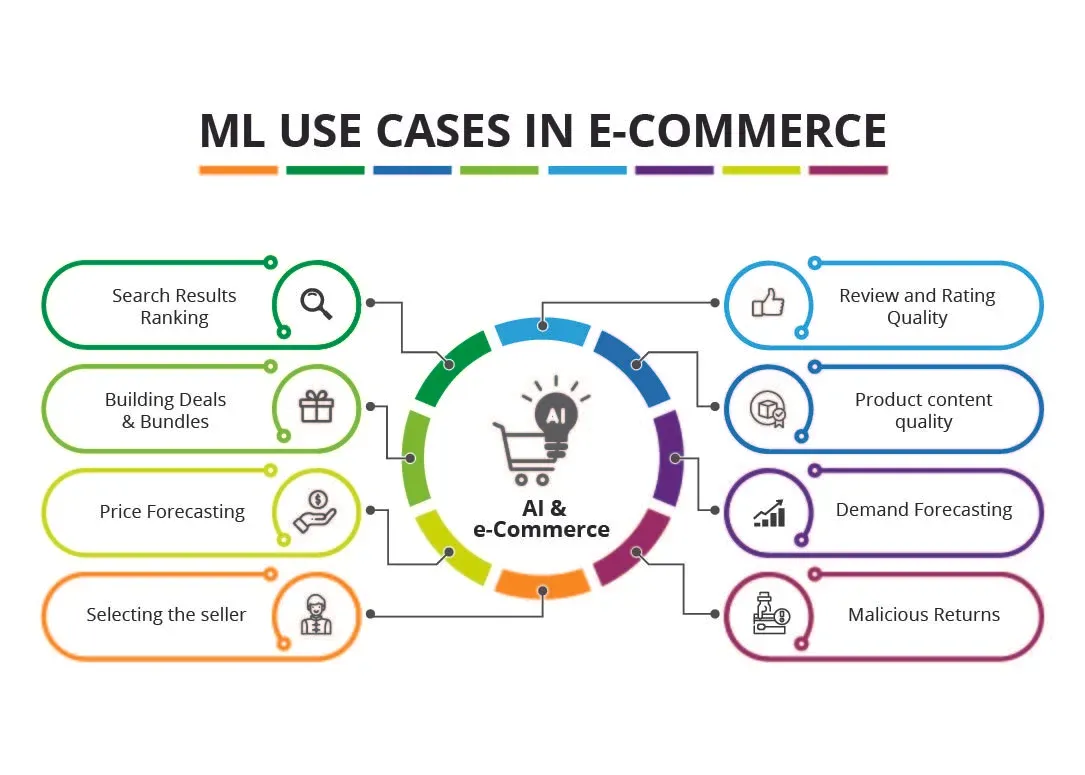
Machine learning development service is leveraged for personalized product recommendations, demand forecasting, and inventory optimization.
It enables businesses to analyze customer behavior, improve customer segmentation, and deliver targeted marketing campaigns.
Now, if you want to begin with machine learning development to enhance customer service in your e-commerce business but have no clue about how to do it, then check out the NO-CODE chatbot platform, named BotPenguin.
With all the heavy work of chatbot development already done for you, BotPenguin allows users to integrate some of the prominent language models like GPT 4, Google PaLM, and Anthropic Claude to create chatbots that are powered by machine learning for platforms like:
- WhatsApp Chatbot
- Facebook Chatbot
- WordPress Chatbot
- Telegram Chatbot
- Website Chatbot
- Squarespace Chatbot
- woocommerce Chatbot
- Instagram Chatbot
Healthcare
Machine learning transforms healthcare by aiding in diagnosis, predicting patient outcomes, and drug discovery. It enables early detection of diseases, risk assessment, and personalized treatment planning, ultimately improving patient care and outcomes.
Finance
In the finance sector, machine learning development service is used for fraud detection, credit scoring, algorithmic trading, and risk assessment.
It helps identify transaction anomalies, automate credit decisions, and optimize investment strategies.
Manufacturing
Machine learning is applied in manufacturing for predictive maintenance, quality control, and supply chain optimization.
By analyzing sensor data and historical patterns, machine learning development service algorithms can detect and prevent equipment failures, enhance product quality, and optimize production processes.
Next, we will cover challenges and considerations for implementing machine learning development service in the business.
Suggested Reading:
Challenges and Considerations for Implementing Machine Learning in Businesses
Implementing machine learning development service in businesses comes with its own set of challenges and considerations.
Organizations need to be aware of these hurdles and take them into account for successful adoption and implementation.
Let's explore some of the key challenges and considerations:
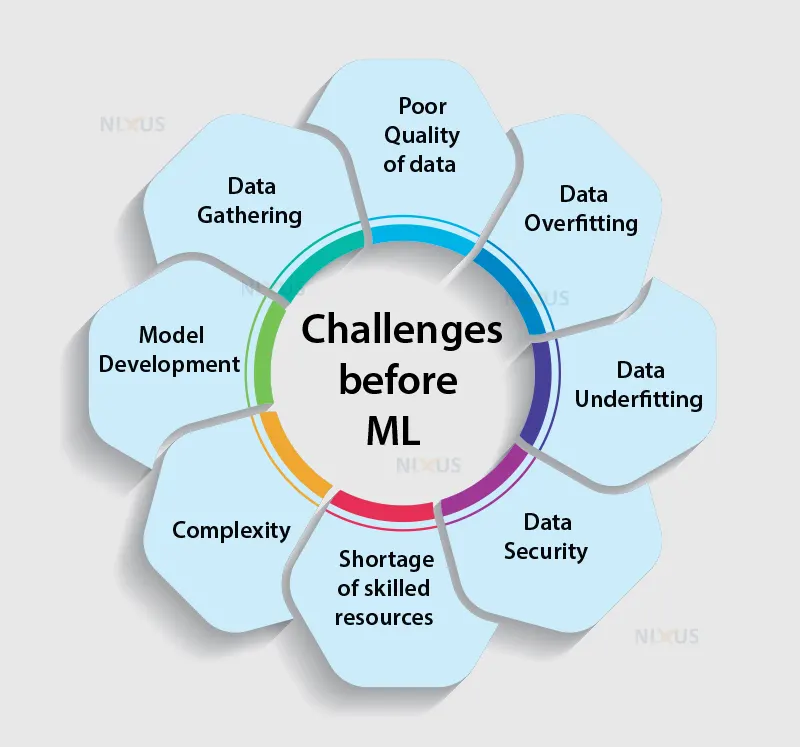
Data quality and availability
One of the major challenges in machine learning implementation is the quality and availability of data.
Machine learning development service models heavily rely on large volumes of high-quality data for accurate predictions and insights.
However, organizations often encounter incomplete or outdated data, inconsistencies, and source incompatibility.
Businesses must ensure data quality through proper data cleaning, preprocessing, and governance practices.
Additionally, organizations may also need to invest in data acquisition or data generation processes to supplement their existing data.
Privacy and security concerns
With the increasing use of machine learning development service, privacy and security concerns surrounding sensitive data have become critical considerations.
Businesses need to protect personal or confidential information while leveraging machine learning techniques.
This involves implementing appropriate security measures, data encryption, access controls, and complying with relevant privacy regulations such as GDPR or HIPAA.
Organizations should have robust data handling policies and protocols to safeguard sensitive information and maintain customer trust.
Ethical considerations
Machine learning development service models have the potential to make decisions and impact societal aspects, raising ethical considerations.
Bias in data or algorithms, fairness concerns, and implications on human lives are some ethical challenges to address.
Organizations need to ensure transparency and fairness in their models' decision-making processes.
They should also have processes to address biases and make ethical decisions, considering the potential consequences on individuals or groups affected by the models' predictions or decisions.
Next, we will cover best practices for machine learning development service implementation.
Best Practices for Machine Learning Implementation
To ensure the successful implementation of machine learning projects, businesses should follow best practices that streamline the process and maximize the benefits.
Here are some key best practices for machine learning implementation:

Clearly define business objectives
Before embarking on a machine learning project, it is essential to define the business objectives and expected outcomes.
This includes understanding the specific problem to be solved, identifying the key metrics, and aligning the project with the overall business strategy.
Clear objectives help in selecting the right machine-learning techniques, gathering relevant data, and evaluating the project's success.
Start small and iterate
Machine learning implementation should begin with small, well-scoped projects rather than aiming for large-scale implementations right away.
Starting small allows organizations to validate the feasibility of the solution, identify any challenges or limitations, and learn from the outcomes.
Through an iterative approach, businesses can gradually scale up their machine-learning initiatives, incorporating feedback and making improvements along the way.
Foster collaboration between data scientists and domain experts
Successful machine learning implementation requires close collaboration between data scientists, who possess technical expertise, and domain experts, who possess in-depth industry knowledge.
This collaboration helps in understanding the business context, identifying relevant features and variables, and aligning the machine-learning solution with the specific needs of the industry.
Regular communication and collaboration between these groups ensure that the machine learning model effectively addresses real-world challenges.
Continuously monitor and evaluate model performance
Machine learning models are not static; their performance can change as data patterns evolve.
Organizations must establish a system for monitoring and evaluating model performance continuously.
This involves tracking key performance metrics, detecting any degradation in performance, and making necessary updates or improvements to the model as needed.
Regular monitoring ensures the machine learning development service model remains accurate, reliable, and aligned with the desired business outcomes.
Conclusion
Machine learning development service is the key to unlocking unprecedented growth for your business. Cut costs, drive efficiencies, and gain valuable insights by harnessing the power of your data.
Don't let challenges hold you back - our comprehensive guide provides best practices to navigate successful implementation.
Transform customer experiences, optimize operations, and make data-driven decisions that give you a competitive edge. Embrace machine learning and future-proof your organization. The time to innovate is now.
Take the first step towards a future of innovation and profitability. Connect with experts and discover how machine learning development service can revolutionize your business.
The possibilities are limitless - what are you waiting for?
Suggested Reading:
Frequently Asked Questions (FAQs)
How does machine learning contribute to business growth and innovation?
Machine learning development service fosters innovation by identifying patterns, predicting trends, and optimizing processes, ultimately driving business growth through data-driven insights.
What industries can benefit the most from incorporating machine learning into their development strategies?
Industries such as finance, healthcare, e-commerce, and manufacturing can benefit significantly from the implementation of machine learning for improved decision-making and efficiency.
What are some successful use cases of machine learning in businesses?
Successful use cases include personalized marketing, fraud detection, demand forecasting, and recommendation systems, showcasing the diverse applications of machine learning in business.
How can small and medium-sized enterprises (SMEs) leverage machine learning for their development?
SMEs can benefit by starting with focused applications, investing in training for employees, and exploring cost-effective cloud-based machine learning services to enhance their operations.

